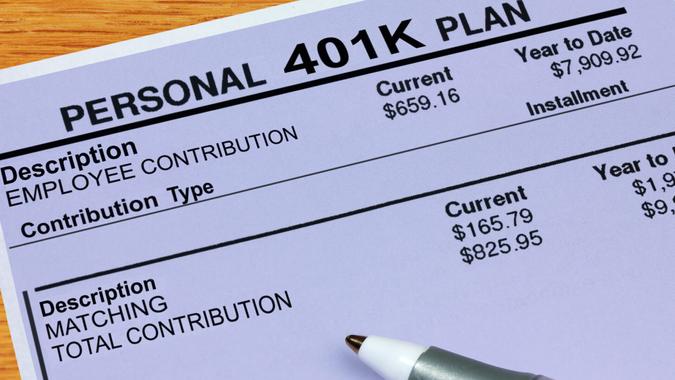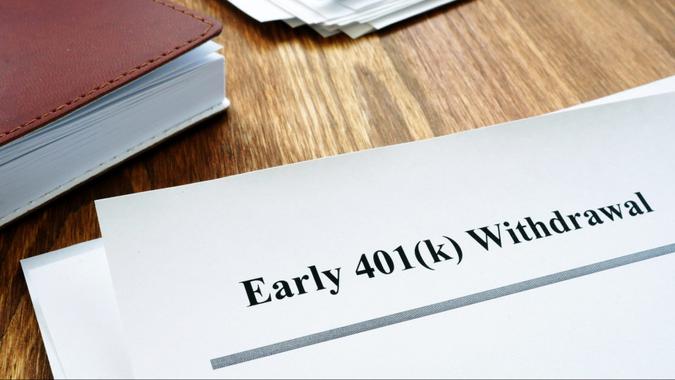One of the most important financial habits is saving money for retirement, but it’s also one of the most challenging. A recent report from Prudential Financial found that 55-year-olds have median retirement savings of less than $50,000, which is “significantly short” of the recommended goal of having eight times your annual income saved by this age.
One-fifth of U.S. adults ages 50 and older have no retirement savings, according to an AARP survey, while more than half (61%) are worried they won’t have enough money to support themselves in retirement.
Learn More: Cutting Expenses for Retirement? Here’s the No. 1 Thing To Get Rid of First
For You: 9 Easy Ways To Build Wealth That Will Last Through Retirement
If you’re way behind on what experts recommend you put away for your golden years, there are likely several reasons for that. Here are five ways you might be starving your retirement savings.
Also see three easy retirement savings changes to make if you feel you’re not doing enough.

Not Setting Aside Enough Money
One of the biggest obstacles to building an adequate nest egg is treating retirement savings as a discretionary expenditure instead of an essential one. Retirement savings should be considered a regular budget item — right alongside housing, utilities and groceries.
A blog from T. Rowe Price recommends saving 15% of your income per year (including any employer contributions). That doesn’t necessarily mean you need to put that much away as soon as you enter the workforce. Aim to save at least 6% at age 25 and then ramp that up by 1 percentage point each year until hitting 15% or more.
The easiest way to save for retirement is to open a 401(k) account and max out your contributions. The money is automatically deducted from your paycheck, meaning you don’t really miss it. Contributions are also tax-deferred, so you won’t have to pay taxes on them until you begin to make withdrawals. If you don’t have access to a 401(k), open an IRA instead and make automatic transfers into the account each month.
Check Out: I’m Planning My Retirement: 5 Expenses I Wish I Had Cut Sooner
Be Aware: 7 Things You’ll Regret Downsizing in Retirement

Waiting Too Long To Start Saving
The best time to start saving for retirement is at the start of your career. The advantage of saving early is that the money will compound, which boosts your savings considerably over time.
Waiting too long means missing out on the compounding effect and reducing the amount of money you’ll eventually have saved up.
Read Next: Retirement Savings: 4 Expenses Retirees Regret Keeping in Their Budgets, According to Experts

Not Taking Full Advantage of an Employer Match
If your employer makes matching contributions to your 401(k), take full advantage of it. Employer matches amount to free money — and maximizing your contributions means you’ll get even more of it.
For example, your employer might match 100% of your contributions up to 6% of your salary. If you don’t take full advantage, it’s like leaving money on the table.

Taking Early Withdrawals
One of the worst things you can do with your retirement savings is take an early withdrawal from a 401(k). With few exceptions, you’ll face early withdrawal penalties if you tap into the account before age 59 1/2. The penalty is 10% of the withdrawal amount.
On top of that, you’ll have to pay taxes on the withdrawal during the year it was made — and you’ll miss out on the compounding effect of the money you withdrew.

Being Reckless With Your Money
Bad financial habits are another major threat to retirement savings, and they usually involve spending more money than you have. Reckless spending not only ruins your budget but also often leads to an increase in your debt load.
Both of these things can put a big dent in your retirement savings.
More From GOBankingRates
- 7 Best Items To Buy at Five Below Before This Winter
- Florida's Retirees Are Fleeing: Experts Predict These 5 States Will Be Top Retirement Spots in 10 Years
- Here's How To Become a Real Estate Investor for Just $1K Using This Bezos-Backed Startup
- 3 Things You Must Do When Your Savings Reach $50,000
This article originally appeared on GOBankingRates.com: 5 Ways You’re Starving Your Retirement Savings
The views and opinions expressed herein are the views and opinions of the author and do not necessarily reflect those of Nasdaq, Inc.



